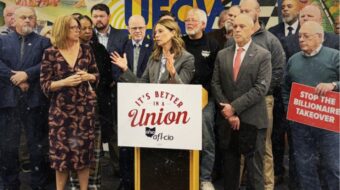WASHINGTON — (PAI) In their long run on the nation’s television screens, Martin Sheen, Brad Whitford and Richard Schiff were always in the “West Wing,” but never on Capitol Hill — until now. But on March 31, the stars of the long-running, critically acclaimed TV series about the White House and its denizens led a cavalcade of workers up to Congress to unveil new ads for the Employee Free Choice Act and to urge senators to pass it.
Their jam-packed press conference alternated between the workers’ stories of the benefits of unionization — and the difficulties of getting it — and the actors’ strong support for organizing and bargaining. As Sheen put it, he wasn’t there so much for himself as for “the people on the other side of the camera.”
It’s those workers — camera operators, grips, aides, stagehands — and other workers nationwide who really need the improvements in wages and working conditions that unions bring, Sheen added.
“We’re here to give celebrity lubrication” to the cause, Whitford told a later session in a small conference room. “Anything we can do to get the cameras on these people” — the workers who need the act — “we’ll do,” he stated.
The three, along with the workers, campaigned in favor of the act, labor’s No. 1 legislative priority. It would help level the playing field between workers and bosses in organizing drives and in bargaining first contracts. It would do so by writing into labor law that workers, not bosses, get to choose the way they select unions: Through verified “majority sign-up” of union authorization cards, or through an NLRB-run election.
The law would also increase fines for labor law-breaking, make it easier to get court orders against repeat offenders and order binding arbitration between labor and management when the two sides can’t reach a first contract 120 days after talks start.
“When in 50 percent of cases after the union is recognized, there is no first contract” after at least a year of bargaining “then the system is broken,” explained Mary Beth Maxwell of American Rights At Work, which organized the two sessions.
Sheen himself jokingly told a story about his first union — of caddies at a country club in Dayton, Ohio — at age 13. He and his colleagues organized it, “I was elected
president, we called a strike” for better working conditions “which lasted 48 hours. And I lasted for 72 before being fired.” He permanently joined unions when he moved to New York and took up acting in 1961.
Turning serious, Sheen added: “Workers share their stories about how majority sign-up succeeded not just for workers but for companies as well. This is not a lost cause, but a just cause.”
Added Schiff, who started in theater by directing the pro-worker play Waiting For Lefty, “When you have a union job, you get fair wages for a hard day’s work and you feel protected. When you don’t have a union job, you’re out there all by yourself.”
The object of the lobbying, by the actors and the workers, is to convince 60 senators to overcome the planned GOP filibuster against the legislation. They face a major roadblock: Past sponsor Arlen Specter, R-Pa., defected and will support the talkathon. That could kill the bill. And the actors, plus some workers, also planned to lobby Sen. Dianne Feinstein, D-Calif., one of several wavering Democrats.
“Feinstein’s statement was disappointing,” AFL-CIO Legislative Director Bill Samuel said. “It’s a fundamental misunderstanding of what the bill would accomplish.”
Feinstein said the measure would hurt workers during a recession, but Samuel responded that “giving workers power helps them come back economically.”
The lobbying continues in the senators’ home states during the congressional holiday recess that began Saturday. That’s also when American Rights At Work starts screening the new TV ads for the bill, emphasizing economic themes and justice on the job. “All we need is for a level playing field,” say workers in one “Faces of EFCA” ad.
Workers at the press conferences took that message to the senators. Unions in Washington helped by draping big pro-Employee Free Choice Act banners on their buildings — including one on Teamsters headquarters, facing the Senate.









